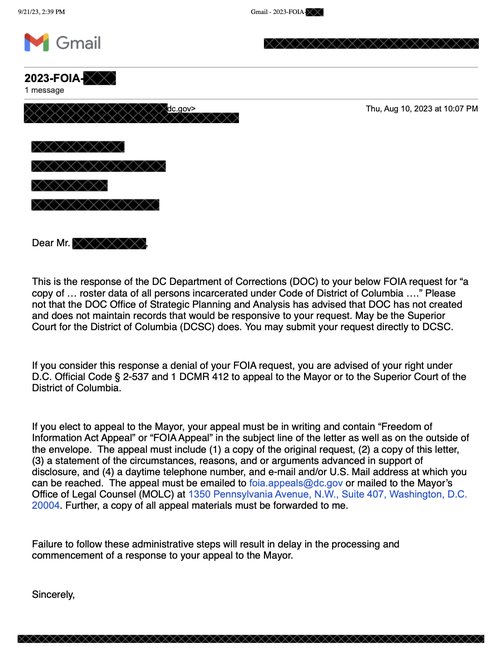DataDistrict of Columbia
Inadequate Data
to perform any analysis.
| Request Responsiveness | |||||
| Financial Accessibility | |||||
| Timeliness | |||||
| No Residency Required | |||||
| Appeal Responsiveness |
*These factors track the process--i.e. the effort and obstacles--for obtaining data from individual states under the Freedom of Information Act (FOIA) request and appeals process. These factors do not measure the quality of the data; only the process of attempting to obtain the data.
Data Status
We were not able to attain any data from the District of Columbia whatsoever.
Washington, D.C. erects significant obstacles to requesting and receiving any data, including a residency requirement – i.e. that the person filing the request be a legal resident of D.C.. Although we attempted to use publicly available web portals to identify individuals incarcerated under felony murder in other states, D.C. has no publicly available web portals.
There is a financial barrier even for those who meet the residency requirement. Washington, D.C. charges fees for searching, reviewing, and reproducing records. There is also a cost to search and/or review even if the search does not locate any responsive records or if records are located, but are withheld as exempt.
"Please not [sic] that the DOC Office of Strategic Planning and Analysis has advised that DOC has not created and does not maintain records that would be responsive to your request."
Legal Overview
In Washington, D.C., felony murder is defined in the first degree murder statute (DC. Statute § 22-2101).
Prosecutors can charge and convict any person of first degree murder without having to prove that they intended to cause another person’s death. Prosecutors must only prove that a person committed another specified felony and that a death occurred.
A conviction for felony murder carries a minimum sentence of 30 years and a maximum of life without the possibility of parole.
Access the Data
Learn more about how you can contribute to transparency when it comes to felony murder.
